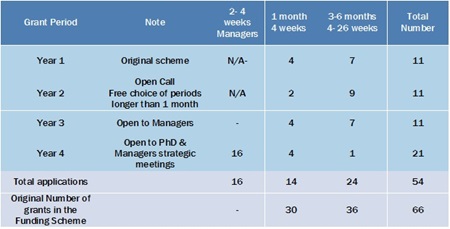One major barrier to reach European Research Area (ERA) is the fragmentation of research activities, programmes and policies across Europe.
One major barrier to reach European Research Area (ERA) is the fragmentation of research activities, programmes and policies across Europe.
The Mobility Work package has the following objectives:
- To ensure an efficient implementation of:
- The Core Projects in the IRPWind;
- The research activity of other EERA Joint Sub Programmes (EERA JSP); and
- The EERA strategic action plan.
- To enhance the cooperation between research organizations involved in the IRPWind fill gaps in the European Research Area in the wind energy sector;
- To connect relevant National projects/Initiatives to the IRP Wind Energy core projects and generally to the EERA JP Wind Energy Joint Sub Programmes, keeping an eye to future emerging technologies and scientific topics; and
- To conduct actions oriented to promote the concept of mobility of researchers as brain gain and to foresight and implement best practice schemes for enabling effective mobility within the European Research Area.
The IRPWind mobility programme is innovative in two aspects: it targets and supports established researchers, from post-doc to managers, for grant lengths over short-term (one months) up to mid-term (six months). The This is based on the lack of European programmes for this category of scientists and for this duration. Indeed, within WP5, it has been possible to experiment novel mobility schemes, summarized in Table 1, to learn about barriers and how to incentivize the mobility of researchers in Europe.
The involvement of different levels of researchers allowed analyzing whether the discussion on the mobility of researchers should be more towards “brain drain or brain gain” or towards the more general “brain circulation”.
Results
The IRPWind mobility programme has been stationary throughout the whole duration of IRPWind, but largely unexploited. Consequently, at the end of the second year, the foreseen large amount of unused funding has been transferred to the WP3 “Infrastructures” to support the mobility of researchers in the joint Experiments/Open Datasets activity. This is a different research-sharing channel seen as mobility of “groups” of scientists. We consider that this confirms the potentiality of the programme.
In addition, funding was used for supporting the participation to the Mobility session at the IRPWind Annual Conference and to support a new scheme for Managers “Participation to strategy meetings”.
Lesson learned
A main lesson learned during the project is that it is difficult for experienced researchers to spend a period abroad without flexibility in the rules. Main obstacles to mobility are family life and work commitment at the home institute.
A crucial issue was how to mobilize IRPWind and EERA JP WIND Top/Senior managers (Members of the Management Board, Work Package Leaders and Steering Committee Members). For this last group, the new scheme “Participation to strategy meetings” was proposed in order to participate to thematic working groups set for discussing strategy design and road mapping.
To consider this, the scheme has evolved by introducing more flexibility in terms of removing calls deadlines (open call) and choice of the grant duration.
A positive outcome is the stimulation of the awareness of the importance of the “Brain Circulation” through mobility of researchers within the EERA JP-WIND researcher’s community.
Statistics
As summarized in Table 1, considering the number of total applications, 54 (50 granted and four rejected) for a total of 6 man years, the programme has been way below the original target of 66 grants for a total of 15.4 years
To summarize, to stimulate circulation and exchange of experienced researchers the solution is a flexible scheme e.g. allowing free choice of the grant duration, having continuous calls and the possibility of splitting the longer periods in a number of shorter ones.

The KPIs summarised in Table2 are: number of papers, involved institutions, number of papers and joint proposals and number of days spent in mobility.

Future Mobility Scheme
During the Strategy meeting the following strategies and scheme were devised:
Aims
- Increase direct and mid-term interaction within EERA JPWIND
- Strengthen joint activities and institutional alignment
- Networking opportunities
- Quick and flexible occasion for joint papers, to design joint projects ideas, etc.
- Ambitious goal to reach 50% female applicants (at least to increase more than the actual 22%)
- Promote mobility towards/from industry, but with agreements for avoiding conflict of interests, IPR issues, etc.
Structure with additional EU funding
- Two schemes: 1-4 weeks (short-term) and 4-12 weeks (mid-term)
- Open calls
- First come, first served
- Opportunity to split mid-term grants in shorter periods
- Peer reviewed evaluation process: two reviewers for the application and one for the final report
- Mobility grant :
Suggestion: 6 short-term, 6 mid-term (110 Keuro) per year (4 year duration, 440 Keuro)
Travel: 600 EUR lump sum
Daily Allowance 161 euro per day (short-term application) or 105 euro (mid-term application);
- Mobility management: 5 KEUR